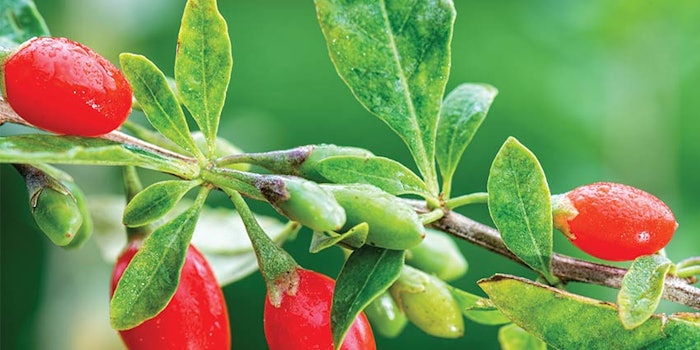
Youth springs eternal beneath the goji berry bush according to ancient and even modern beliefs. As the BBC reports, legend has it that more than 2,000 years ago, a doctor visited a Chinese village where everyone was more than 100 years old. He observed they all drank from a well surrounded by goji berries and theorized that that once the fruit ripened, it fell into the well where its rich vitamin content seeped into the water.1
Another tale references the 17th Century herbalist Li Qing Yuen, who is said to have eaten goji berries daily and lived until he was 252 years old. Today, goji berry is viewed worldwide as a superfood, and younger generations are consuming it in new ways, e.g., goji berry tea in “wellness kettles.”1 The berries can be eaten raw, cooked or dried and used in herbal teas, as noted; juices; wines: and medicines.2
Also known as wolfberry and Lycium barbarum, goji berry is native to China. The bright, orange-red berry grows on shrubs. WebMD reports that people have used goji berries to try to treat common health problems such as diabetes, high blood pressure, fever and age-related eye issues. According to a review published in Oxidative Medicine and Cellular Longevity, the berries also enhance hemopoiesis (the production of blood cells and platelets); impart anti-radiation, anti-aging and anticancer effects; improve immunity; and boost antioxidation.3 Additional benefits reported include: creating a sense of calmness and well-being; better athletic performance; better sleep; and weight loss.2
Active Elements and Anti-aging Health Benefits
Goji berries are rich in vitamins and minerals such as vitamins A and C, fiber and iron, and are good source of protein and antioxidants. Their high antioxidant levels can alleviate oxidative stress to provide health benefits such as preventing free radical damage to DNA, lipids and proteins.2
The biological activity of goji berries is attributed to their carotenoid, phenolic and, most notably, their polysaccharide content. More specifically, they contain polysaccharides; betaine, a natural amino acid; ßβ-carotene; zeaxanthin; 2-O-ßβ-D-glucopyranosyl-L-ascorbic acid, a natural derivative of vitamin C; and flavonoids. Notably, synergistic and additive effects of mixtures of phytochemicals from goji berry with other sources have been reported to provide improved protection.3
Continue reading about the skin benefits of goji berry in our Digital Magazine...
Rachel Grabenhofer is the managing scientific editor of Cosmetics & Toiletries Skin Inc.’s sister brand for cosmetic chemists. She’s a member of the Skin Microbiome Council and Society of Cosmetic Chemists, and for several years, led judging panels to honor the best ingredients in cosmetics.











